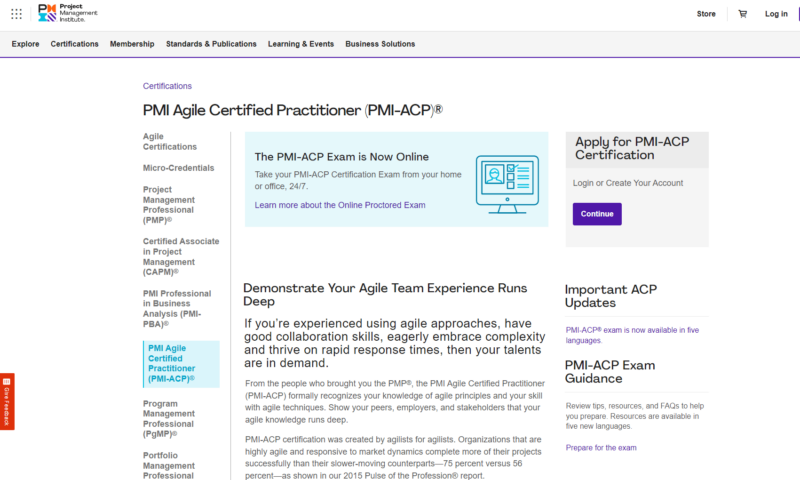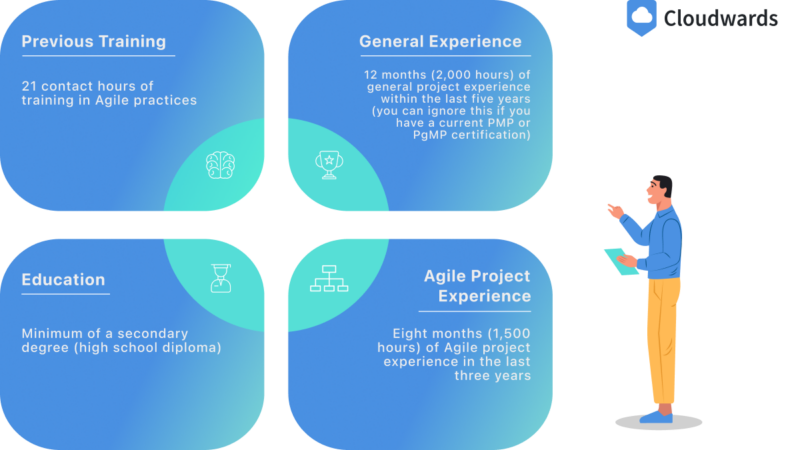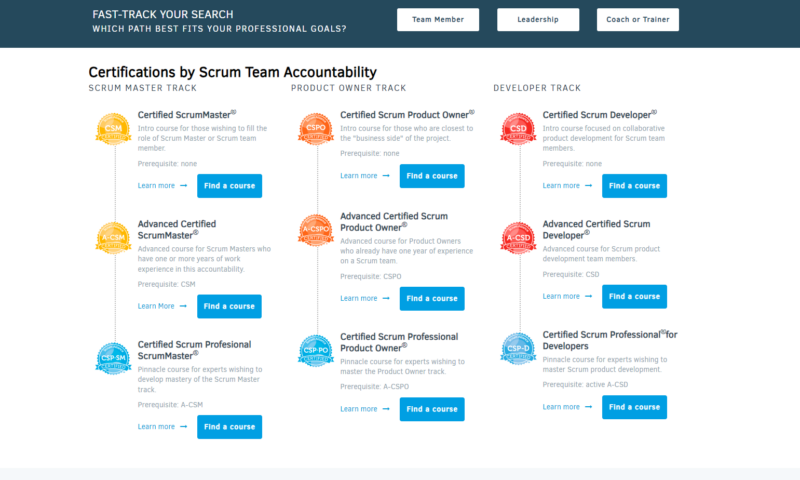What Is PMI-ACP Certification? 2025 Guide
Agile team members and project managers working with Agile teams will greatly benefit from getting PMI’s Agile Certified Practitioner certification. Our what is PMI-ACP guide will tell you all you need to know about this globally recognized certification.
The Project Management Institute’s Agile Certified Practitioner credential is one of the best options for project managers who want to manage Agile teams. The PMI-ACP shows that you understand Agile principles, methods and tools, including those found in some of the best project management software platforms. To learn more, continue reading our what is PMI-ACP guide.
In the following sections, you’ll learn about the PMI-ACP certification, its prerequisites, its cost and the exam’s outline. We’ll even share hints and tips to help you prepare for the exam. We know you’re eager to learn, so we’ll jump right in.
What Is PMI-ACP Certification?
The Project Management Institute Agile Certified Practitioner (PMI-ACP) is a globally recognized certification. It will help you show current and prospective employers that you understand Agile project management principles and are familiar with Agile methodologies, frameworks and tools.
To become an Agile Certified Practitioner, you must sit for the PMI’s ACP certification exam. The exam covers many domains, including principles and the Agile mindset, value-driven delivery, stakeholder engagement, adaptive planning and more. We’ll cover these domains in more detail below.

Before taking the 120-question, three-hour exam, you must also meet specific professional and educational criteria, which we’ll also cover in detail below. Obtaining the PMI-ACP might sound challenging, but the benefits of becoming a PMI Agile Certified Practitioner far outweigh the drawbacks, such as the cost and preparation time.
Which Agile Methodologies Does the PMI-ACP Cover?
The birth of Agile principles and guidelines came from the desire for teams to move away from rigid traditional project management methodologies, like Waterfall and the Critical Path Method (CPM). If you want to successfully obtain the PMI-ACP, you’ll need to know the following Agile approaches that stem from the Agile Manifesto:
- Scrum — The Scrum framework is for development teams that need flexibility, and those that thrive on collaboration and open communication.
- Extreme Programming (XP) — This is a customer-forward approach to software development that favors short work cycles and frequent iteration releases.
- Lean — The Lean method helps organizations cut costs and increase efficiency by optimizing processes and finding the best way to deliver value to the customer. If you’re looking for Lean software, see our Leantime review.
- Kanban — Kanban is a visual approach to project management that creates efficient workflows and, like Lean, helps reduce costs and waste. If you’re looking for kanban software, see our roundup of the best kanban apps.
- Test Driven Development (TDD) — A derivative of XP, TDD is an iterative software development framework that combines test creation and refactoring (if needed).
PMI-ACP Exam Eligibility Requirements
To take the PMI-ACP exam, you must meet the Project Management Institute’s minimum requirements. We’ll cover the requirements below.
| Previous Training | General Experience | Education | Agile Experience |
|---|---|---|---|
| 21 contact hours of training in Agile practices | 12 months (2,000 hours) of general project experience within the last five years (you can ignore this if you have a current PMP or PgMP certification) | Minimum of a secondary degree (high school diploma) | Eight months (1,500 hours) of Agile project experience in the last three years |
Meeting the requirements to sit for the PMI-ACP exam will show the PMI that you have the knowledge required to succeed. If you have a PMI-PMP or PgMP certification, you can skip the condition that calls for 12 months (2,000 hours) of experience. It’s worth noting that these certifications are not prerequisites.

To qualify, applicants must prove they have 21 contact hours of Agile training, a secondary education degree and eight months (1,500 hours) of Agile experience in the last three years.
PMI-ACP Exam Topics
The PMI-ACP exam covers a broad range of Agile topics, or domains, as the PMI calls them. Below, we’ll take a look at the exam content outline.
- Agile principles and mindset — This section covers embracing Agile’s principles within the context of a project team and organization. It accounts for 16% of the exam.
- Value-driven delivery — This part involves the ability to deliver valuable results via incremental product releases for stakeholders to review. The domain also looks at the use of stakeholder feedback. It accounts for 20% of the exam.
- Stakeholder engagement — This segment covers stakeholder engagement and tests you on meeting their needs, understanding the cost and efforts involved, and promoting collaboration throughout a project’s lifecycle. It accounts for 17% of the exam.
- Team performance — This domain asks you to show how to create an environment of trust, learning and collaboration with Agile teams. Self-organization and conflict resolution are also covered. It accounts for 16% of the exam.
- Adaptive planning — This portion of the exam covers project plans from initiation to closure. You can expect to be asked about goals, project value, risks, constraints, feedback and reviews. It accounts for 12% of the exam.
- Problem detection and resolution — The second-to-last domain involves risk management and tests how to identify, prioritize and solve problems. It accounts for 10% of the exam.
- Continuous improvement — This domain covers the value of products, along with ways to continuously improve their quality, the process and the team. It accounts for 9% of the exam.
How Difficult Is the PMI-ACP Certification?
The relative difficulty of the PMI-ACP exam will depend on you. No exam is designed to be easy, but you’ll likely be fine with the right experience, education and planning. Below, we will examine a few factors that could determine whether you find the test easy or hard.
Experience
One of the biggest factors will be your personal experience working on Agile projects, and you’ll need to meet the minimum requirements to take the exam. However, even with the prerequisites — do you feel that you know enough about Agile practices, including Scrum, XP, Lean, TDD and Kanban? If not, you might want to learn more before sitting for this PMI certification.
Education
As with experience, your education level will affect how hard the PMI-ACP exam is for you. Again, you’ll need to meet the minimum education requirements. Still, you’ll find this exam easier if you hold other certifications, like any of the best Scrum certifications or perhaps some of the best project management certifications.

understanding of Scrum, could make the PMI-ACP easier.
Studying
No matter your education or experience, studying always pays off. If you self-study or utilize a study group for the PMI-ACP, you’ll be in far better shape than if you don’t. You can study by reading the PMI-ACP handbook and the recommended reference materials. If you want a better chance of passing, grab a coffee, pick up a reference book and get reading.
Why Take the PMI-ACP Exam?
As you can imagine, obtaining the PMI-ACP certification can help enhance your project management career. Some benefits of having the PMI-ACP are listed below.
Recognition
The PMI’s ACP certification is globally recognized. Holding this certificate will show a current or prospective employer that you’re a disciplined Agile project manager with substantial Agile knowledge. It proves you can lead Agile teams while using the most popular frameworks, and it also demonstrates your knowledge of the tools and techniques that can lead to success.
Better Jobs
If you work on professional development, you’ll quickly find that many doors will open for you. With a certification like the PMI-ACP, you can apply for better jobs that would have you leading Agile teams in Scrum, XP, Lean, TDD and Kanban anywhere in the world.
Increased Pay
Along with better jobs and global recognition, you can expect to earn more money when you obtain and maintain your PMI-ACP. Pay will vary by region, but you should expect your earning potential to increase nonetheless.
How Can I Prepare for the PMI-ACP?
As noted above, the PMI has a list of reference materials that all applicants should familiarize themselves with. If multiple people from your organization are taking the exam, it might be worth forming a study group where you can help each other cover the study materials. Unfortunately, the PMI does not offer practice exams for the PMI-ACP.
If you don’t want to study on your own, you might want to consider taking a PMI-ACP course that will help you prepare. These courses are held by local PMI chapters that will require you to become a member. Prep courses, which vary in cost, are also available from the Project Management Academy, the Master of Project Academy and others.
Strategies for Success
Deciding to take an exam can fill you with dread and make you feel fearful. However, you can make it through the test without stress with the right exam strategies. Below, we’ll share a few techniques that will help focus your mind.
- Listen to the instructions — Before the exam starts, the proctor will give you instructions to follow. Set yourself up for success by listening to the do’s and don’ts.
- Manage your time — The PMI-ACP exam lasts three hours. As you work through the 120 questions, check the clock to see how much time remains.
- Don’t rush — Take a deep breath, slow down, focus on your answer and move on to the next question. Don’t skip between questions.
- Prioritize — Identify which questions you know the solutions to and answer them first. Then return to the questions that require a little more time.
- Check your answers — If you have time, go back over the exam and check your answers to ensure they’re as good as can be.
How Much Does the PMI-ACP Exam Cost?
The PMI-ACP exam is quite affordable. PMI members can pay $435 to sit for the exam. If you’re a non-member, the cost of the exam rises to $495.
What’s the Difference Between PMP & PMI-ACP?
The Project Management Professional (PMP) certification is an advanced credential showing that project managers have the skills to manage many processes and people. It proves you can motivate teams while using Agile, traditional and hybrid project management methodologies to lead teams to success. It also confirms that you have a firm understanding of business priorities.
The ACP certification shows that you have a deep understanding of Agile principles and tools. It also proves you can get teams, clients and stakeholders to communicate and collaborate, that you’re adaptable and flexible, and that you understand popular Agile frameworks like Kanban, Scrum, XP, Lean and TDD.
Final Thoughts
If you’re ready to lead Agile teams to success via popular frameworks like Scrum, Lean, XP, TDD and Kanban, the PMI-ACP certification might be for you. The certification will prove your knowledge, increase your job prospects and enhance your earning potential. We hope our PMI-ACP guide has helped you understand what to expect if you decide to take the exam.
Have you taken the PMI-ACP certification exam? Did you find it easy or hard? Did it lead to a better job or increased pay? Is there anything about the certification that you’d like to share? If so, let us know in the comments, and as always, thanks for reading.
FAQ: PMI-ACP Guide
The PMI-ACP shows that you have the knowledge to lead Agile project teams across various industries using frameworks such as TDD, Scrum, Kanban, XP and Lean.
Absolutely. The certification will help you land better jobs, increase your pay and give you global recognition.
Ultimately, the PMP is the better certification as it shows you fully understand traditional and Agile project management methods and tools. It also demonstrates that you can manage teams effectively. However, the PMI-ACP may be the better option if you only plan to work with Agile teams and frameworks.
The difficulty of the PMI-ACP exam will vary based on your experience, your education levels and whether or not you studied for the test.


